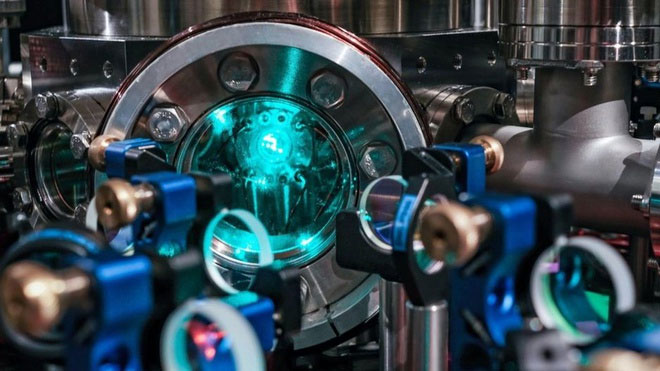This world's coldest quantum computer will beat Google
This type of super cold quantum computer will defeat the projects that Google and IBM are researching.
ColdQuanta , a US-based company has partnered with the Defense Advanced Research Projects Agency (DARPA) to create a quantum computer capable of locating fighter aircraft in the case of radar systems. of the army was partially destroyed.
According to the BBC, atoms in computers can calculate at very fast speeds after gathering data in the form of qubits (quantum bits) - this unit in quantum computers is the same as bits in classical computers.

Quantum computers are at a stage of development with many promising benefits. (Photo: Jack Hao Yang).
To do this, the atoms in the computer must be extremely cold. In other words, this is the coldest computer in the world.
Despite appearing quite a lot in science fiction movies, quantum computer development is still in its early stages. Companies are just starting to create quantum systems, with the promise that they will outperform classical computers.
'Our mission in the next 40 months is to create a machine with thousands of qubits to solve national security situations' , shared Bo Ewald, CEO of ColdQuanta.
Besides the military, quantum computers can be applied in many fields such as drug preparation, investment strategy analysis, jailbreaking and solving problems in the field of transportation.
There are millions of ways to solve the above problems and quantum computers will come up with the most suitable solution in a snap. According to Ewald, even today's most powerful supercomputers take hours or days to calculate.
Technology companies such as IBM and Google are also participating in the production of superconducting quantum computers. Although they are also quantum, they use charged atoms (ions) instead of extremely cold neutral atoms.

ColdQuanta's quantum computer uses atoms kept at extremely cold temperatures. (Photo: ColdQuanta).
If the ionic atoms in Google or IBM's superconducting quantum computers are set to 0.001 degrees kelvin, the neutral atoms in ColdQuanta's computer are cooled to 0.000001 degrees kelvin. This temperature is colder than anything we have ever known. To make it easier to imagine, the absolute zero temperature state is 0 degrees kelvin, equivalent to -273.15 degrees Celsius.
Andrew Daley, professor at Strathclyde University, UK, said that the colder the atom, the easier it is to control. Scientists can place atoms in 2- or 3-dimensional shapes, arranged closer together in computers.
The shape and position of the atoms are very important because having an extra atom means the machine's processing capacity is doubled.
Pasqal, a French quantum computer startup, is also developing a prototype system based on ColdQuanta's ideas. Pasqal's system will be available to energy corporations to efficiently calculate electric vehicle charging times. The goal of this is to help reduce the time it takes to charge all vehicles, while ensuring certain important vehicles are prioritized.
Currently, the benefits of quantum computers are still only promising. However, people can absolutely witness the benefits that quantum computers bring in the next few years thanks to systems from IBM, Google, ColdQuanta and some other companies.
- Google makes quantum computers, a billion times stronger than the current most powerful supercomputers
- China claims to own the world's most powerful quantum computer system
- How far has the quantum computer developed?
- NASA revealed that Google is about to build the world's most powerful computer
- 'Bitcoin Destroyer' - What is a quantum computer really?
- China successfully developed the world's first quantum computer
- China's new quantum supercomputer operates
- Google and NASA developed computers 100 million times more powerful than conventional computers
- Google is about to come out with a laptop
- Create the first quantum byte
- What is quantum computing and its importance to people?
- For the first time, quantum computers have been proven to be more powerful than classical computers
 The US company is about to build a supersonic passenger plane of 6,000km / h
The US company is about to build a supersonic passenger plane of 6,000km / h Japan develops avatar robot as in fiction film
Japan develops avatar robot as in fiction film Australia tested the world's first mango picking robot
Australia tested the world's first mango picking robot America develops technology to separate water from animal waste
America develops technology to separate water from animal waste The most powerful computer in the world
The most powerful computer in the world  China produces -273 degree C quantum computer refrigerator
China produces -273 degree C quantum computer refrigerator  The Secret Behind Quantum Entanglement: Have Aliens Really Visited Earth?
The Secret Behind Quantum Entanglement: Have Aliens Really Visited Earth?  The greatest contradiction of contemporary physics, Albert Einstein spent half his life but could not solve it
The greatest contradiction of contemporary physics, Albert Einstein spent half his life but could not solve it  China has successfully built the first quantum engine using quantum entanglement.
China has successfully built the first quantum engine using quantum entanglement.  China 'unveils' 504 qubit superconducting quantum computer
China 'unveils' 504 qubit superconducting quantum computer 